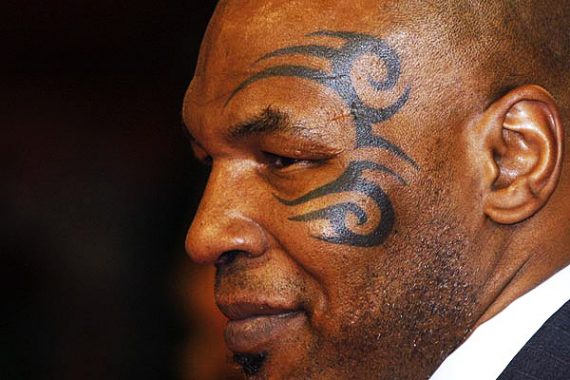Who Owns a Tattoo?
Those who tattoo celebrities want to be be paid when their tattoos appear in the media.
Those who tattoo celebrities want to be be paid when their tattoos appear in the media.
WSJ (“Athletes’ Tattoo Artists File Copyright Suits, Leaving Indelible Mark“):
Phoenix-based tattoo artist Chris Escobedo took an intellectual property rights training course and in 2012 sued now-bankrupt videogame developer THQ Inc. over a mixed-martial arts game in which one of his tattoos—a large, scowling lion on the right rib cage of Ultimate Fighting Championship star Carlos Condit—makes a cameo appearance.
[…]
Such lawsuits have left a mark. When videogame giant EA Sports, a brand of Electronic Arts Inc., developed its own fighting game featuring Mr. Condit, which will be released this week, it left out the lion, causing gamers to growl. Electronic Arts declined to comment.
“That tattoo artist must feel he now owns a portion of carlos condits rib cage too huh?” wrote one fan on an EA online forum after seeing early screenshots.
[…]
The question of who owns the copyright to a tattoo has never been settled in court, but lawyers and scholars say there is no obvious reason why tattoo artists shouldn’t be covered by the same rights granted to photographers or other visual artists.
To be copyrightable, artwork needs to have some originality. It also has to be “fixed in a tangible medium of expression.” That can be a canvas, film or audio. Skin counts, too, in the case of a custom tattoo designed by an artist, said Case Western Reserve University law professor Aaron Perzanowski, who teaches intellectual property law.
A turning point in the debate was a lawsuit over the 2011 summer blockbuster “The Hangover Part II,” in which a character awakens after a night of debauchery to find a replica of Mike Tyson’s widely recognized Maori-inspired facial tattoo etched on his own forehead.
The Missouri tattooist who designed the image, S. Victor Whitmill, sued Warner Bros. Entertainment Inc. for copyright infringement, claiming he was owed for contributing to a key punch line.
While allowing the film’s release, U.S. District Judge Catherine D. Perry, who presided over the case, was sympathetic to his argument. “Of course tattoos can be copyrighted,” she said. “I don’t think there is any reasonable dispute about that.”
[…]
The NFL Players Association, which licenses images of the players to EA, has started encouraging athletes to obtain licenses for their body art. “We advise players to do that so they don’t have to go through any of the potential litigation,” said George Atallah, a spokesman for the union.
EA played it safe it when it incorporated San Francisco 49ers quarterback Colin Kaepernick’s tapestry of tattoos into the latest installment of its popular Madden NFL videogame series.
EA Sports recently tweeted out teaser screenshots of “Madden NFL 15”—coming out in late August—that showed a digitized rendering of the 26-year-old star bearing the same snippets of psalms on his arms that he flaunts on the field. EA says it scanned images of his tattoos only after getting legal authorization from the artists who drew them.
“Regarding artists and forms, we can’t comment on the specifics, but we’re comfortable with the process,” a spokesman for EA said.
I’m by no means an expert in intellectual property law but this strikes me as defying common sense.
If an artist creates an original work, he should reasonably own the rights to it as a work. Whether it’s a painting, photograph, sketching, or tattoo, they should be able to profit from reproductions of that work in other media where the work itself is the object. So, for example, a poster print, t-shirt, or other for-profit rendering of that work of art should have to be licensed from the artist.
In the cases in question, however, the art is an incidental decoration. Buyers of sports videogames are interested in authentic representations of the famous athletes, who happen to be tattooed, rather than in the tattoos themselves. The rights to depict Condit or Kaepernick should rest solely with them, unless they’ve surrendered those rights to their sporting associations as part of their contract.
Their tattoo artists deserve nothing additional for their work for hire, the increased value of which comes from the fact of the celebrity of the wearer, not the work of the artist. But, unless the celebrity also paid for them, the artist should still own the rights to sell that tattoo to fans of the celebrity, make t-shirts and posters of the art itself (i.e, not including the celebrity likeness) and otherwise continue to profit from the art as a work.
The Tyson/”Hangover 2″ case strikes me as more complicated, although I side with the movie studio over the tattoo artist. The gag is based on the celebrity of Tyson, who was already being compensated as an actor in the film, and not the art as art. That is, the image only made for an effective joke because it appeared on Tyson’s face. But, if the studio wanted to sell images of the tattoo artwork as part of its merchandising, the artist might well deserve compensation.






Since Intellectual Property Law defies common sense in general, you’re as much an expert as anyone else.
Leaving that aside, this strikes me as a property rights question. Unless they’ve entered into a contract with an athlete or celebrity that says that they would not give the tattoo to anyone else, they have the right to sell the design of the tattoo to anyone they see fit. However, they don’t have any rights over the incidental depiction of that tattoo on a representation of the athlete in a video game any more than they would have a right to royalties if a TV star had a visible tattoo that people saw every week they tuned into a top-rated television program.
Suppose an artist painted a picture and sold it to a Kardashian who then hung it in her house where it showed up every week on their tv show in the background. Would that artist have any right to be compensated for having the picture displayed as part of the show? I wouldn’t think so but isn’t this kind of the same situation? As long as they weren’t selling reproductions of the art, did they get the right to display it when they bought it?
This has to be the stupidest thing I’ve ever heard of. What’s next, Nike demanding residuals when you wear their $100 sneakers out in public since someone else can see it? It should be the other way around. Individuals with tattoos should be charging rent as they are walking billboards for the artists, displaying their work and drumming up buzz. I understand trying to make a living off your art but this just smacks of greed and control.
The very nature of their work incorporates their “art” into someone’s physical being. In order to enforce such intellectual property rights, de facto physical property rights on a human being via their physical appearance are brought into play. That way lies a mess of legal and ethics.
A scenario – former Disney wholesome starlet got an visible neck tattoo back in the day. The studio owns nothing, its all her. It’s now so famous and tied to her the artist makes decent money on marketing just the tattoo image alone. Do we really want to work out the logistics of who owns a starlet’s tattoos when she’s crashing and burning on TMZ and the artist wants his image disassociated with her, possibly by means of forced laser removal? What if the artist is worried that her actions are hurting his t-shirts sales (which, come on, won’t be a big mover then) and sues to gain control? Can he demand she be legally forced to cover up so it no longer visible? Can he demand that each and ever image of her be censored without his direct approval, thus causing loss of agency on her own legal control of image? Her actions are directly cutting into his sales – can he sue her for damages?
Wanna make it worse? What if the tattoo artist and subject are married – who gets the tattoo rights in the divorce?
This way lies madness, James.
@Doug Mataconis:
Yeah…I think that’s the key word…
My firm hires the best photographers in the country to photograph our work. Often they retain copyright by contract which limits our use. Unless the tatoo artist is providing a contract agreement that claims that copyright and the tatoo-ee signs on to that contract…I don’t think there’s a legitimate claim.
Our drawings are copyrighted. But the client paid for them to be produced and they own them. There are limits to what they can do with the drawings. But they certainly don’t owe us money every time one of the buildings is photographed.
What would be interesting to know…and I don’t…is what about things like Frank Gehry’s Disney Concert Hall in LA…which shows up in all kinds of TV ads. Is he getting royalties? I doubt it…although the foundation running the Concert Hall may…but anything is possible.
@Doug Mataconis: That occurred to me as well. Surely, the television networks airing NBA games shouldn’t have to pay licensing rights to the tattoo artists.
@beth: I agree with you as to what the law should be. But I”ve noticed increasingly that shows are digitally blurring artwork hanging in houses, especially on various home improvement type shows.
@KM: But my solution fixes all that. The artist should have no rights in the incidental association of the tattoo with the celebrity. If said celebrity makes the image famous and he can cash in selling it on t-shirts or posters, great. If the celebrity association hurts the value, too bad. He, naturally, has no right to control her display of the art. As to the property rights in a divorce settlement, I presume that’s pretty well worked out by now. But, in any event, it would just be the rights to the art, not to the celebrity association.
How about when I wear a t shirt with some company name or symbol? Isn’t that advertising?
First world problem.
Well, I don’t know if they would or not, but there would be plenty of lawyers who would be willing to initiate action as if they were entitled to that. This is one of the reasons that artwork on the wall s is usually blurred out on reality tv shows
Wouldn’t you have to start tattooing small ®s and ©s and ™s into every tattoo for this to be feasible?
Emphasis mine, because if it’s a work-for-hire doesn’t it cut off the artist’s proprietary interest in the work and end the analysis?
I think the “work for hire” exemption should take care of this. It’s not like a tattoo artist gets to “paint his canvas” and then offer it to the buyer. He can surely have copyright for the design, but not for the actual artwork, or any depiction on the person. To go with the two cases above, why is a tattoo copyrighted when it’s shown in electronic rendering of a person but not when shown on a photographic rendering? Similar, why is the tattoo copyrighted if shown as a non-tattoo design on an actor but not on the buyer in the same picture?
Not to say that what a court decides on it isn’t wide open, I’d like to see both Thomas’ and Ginsburg’s opinions on it ;).
As it turns out, I am a copyright lawyer. The first thing you need to keep in mind is that copyright law is statutory. Judges have a very limited ability to “adapt” the statute to real life. For reasons that could fill up books (and actually do), copyright as a concept doesn’t fit very neatly into how modern society actually operates and that failure to fit becomes more and more evident as creators recognize that some long-standing practice — the painting in the background of a movie or photo, a tattoo on any person in a photo or video game — is, from a simple technical reading of the copyright statute, a reproduction of their work.
Instructively, architectural copyrights (like Frank Gehry’s Disney Concert Hall) have a statutory exclusion. The statute says you can reproduce images of actual buildings despite the fact that those images inherently reflect the protectible design of the building. To achieve what the commenters above want – an exception for incidental inclusion – makes some sense but would quite literally take an act of Congress to fix.
There is another big problem in the Copyright Act relating to how damages are calculated. In a case like the tattoo in the video game, the question is whether the infringing “work” is the whole game or some much smaller element like the frames where the tattoo appears. Since a common statutory remedy for infringement is recovery of the profits from the infringing “work,” that is a hugely important question on which the statute really doesn’t shed much helpful light.
I’ve always thought that Ralph Lauren and Calvin Klein (and many others) are marketing geniuses because they can get consumers to purchase their expensive clothing, with their logos prominently displayed, and not have to pay consumers a fee to advertise their gear.
@beth:
Any one who works in production of movies or TV knows this issue well. Any photo, logo, brand has to be “cleared” by the studio or network legal team. In fact, most studios and networks have people who’s only job is to clear art, logos and brands for use as incidental background in films and TV shows.
If we have an actor who has a tatoo, we either have to alter it (done very simply with a sharpie or makeup) to make it different than tht original tattoo, or cover it up completely. Can’t tell you how many times we’ve cast an actress (happens more with women because their tattoos are covered up) only to discover she has a tattoo we need to alter/cover before her bikini/shorts/miniskirt scene. It happens more with women because their tattoos are covered up more than men.)
So this is not surprising to me. I would advise any famous person who is getting a tattoo to get the tattoo artist to sign a release. “Once the tattoo is on my body, I own all rights to it, to do as I please; wherever, whenever I please, in perpetuity.” If the tattoo artist won’t sign, don’t get the tattoo from that artist, and find one that will sign the release.
Otherwise, you’re asking for a world of hurt if you’re famous.
There is another end of this…pun intended.
I used to live with a woman that had a Superman logo tattooed on her left buttock.
I seriously doubt the tattoo-er or the tattoo-ee paid any copyright fees to DC Comics.
Unfortunately I cannot remember specifically which logo it was…
http://io9.com/5975491/a-history-of-superman-told-in-25-logos-over-75-years
@al-Ameda: My father would not buy those kind of shirts – he said that he was not going to provide free advertising for some millionaire’s business.
“Who Owns a Tattoo?”
Mr. Rourke, of course.
Yeah, I’m dating myself…
Their tattoo artists deserve nothing additional for their work for hire, the increased value of which comes from the fact of the celebrity of the wearer, not the work of the artist.
This is actually a key question, and not one that I know the answer to. In the absence of specific contract language, does the tattoo constitute a work for hire? If it’s not a work for hire, then IMO, video-game makers and others ought to seek permission from the tattoo artists before re-using those tattoos in games.
@Joe:
In the case of a commercial product, I would think the sensible definition of the “work” would be the smallest unit that is sold separately. Which, in the case of the video game, is the whole game.
Thanks for the injected facts, Joe.
@Moosebreath: De plane!! De plane!!
@Joe: Don’t courts have some leeway in this under the fair use doctrine? Under fair use, I think you could have (say) a tattoo appearing for a few minutes during NBC’s broadcast of a football game, or Mike Tyson’s tattoo showing up in a news photograph.
But I have trouble seeing a video game maker or a movie maker putting forward a successful fair use defense, assuming a tattoo artist has a valid claim.
Years ago, I was acquainted with a well-know artist who worked primarily in the music business. He sold one of his paintings (for a healthy price) to a popular singer, who used it as cover art for an album that went platinum many times over.
The artist complained bitterly for many years about how he had been ripped off, that he should have received a royalty for each album sold.
No one had much sympathy for him. He sold the painting with no contract or stipulations. If the painting had turned out to be an overpriced piece of crap, I doubt the artist would have offered a partial refund of the purchase price.
the entire concept of intellectual property as applied in this country defies common sense. Copyright laws should be unilaterally rolled back to what the founders intended as promoting the useful arts and sciences and any law that promotes gate-keeping should downed in a bathtub.
One other thought, we need to strengthen fair use of copyrighted material, some mother who wants to use a snippet of the Muppet Movie in their kids birthday video should not be beholden to the copyright holder for anything. This is getting absurd.
Except that I wonder if you could use the “taking photos of something in public view” exception.
An architect can claim a copyright in the designs of a house he had had built to his specifications, but be can’t keep other people from taking pictures of that house from the sidewalk. Ditto for anything considered public art.
Now putting it into a video game….that’s another thing. Text snippets we’ve got a lot of law figuring out what “fair use” is. Video stuff? Ugh.
Considering that copyright law is totally gummed up anyway……